



The Nifty 50 extended its upward journey with above-average volumes for another session on March 6, rising by nearly one percent with healthy breadth. Bulls seem to be gaining strength as they pushed the Nifty beyond the first hurdle of 22,500 and got back above the 5 and 10-day EMAs. According to experts, if the index manages to clear and sustain above the next key hurdle of the 22,750-22,800 zone in the upcoming sessions, then 23,000 will be the level to watch. However, in the case of minor profit booking, 22,250 is likely to act as a support zone, followed by 22,000, which is the crucial support.
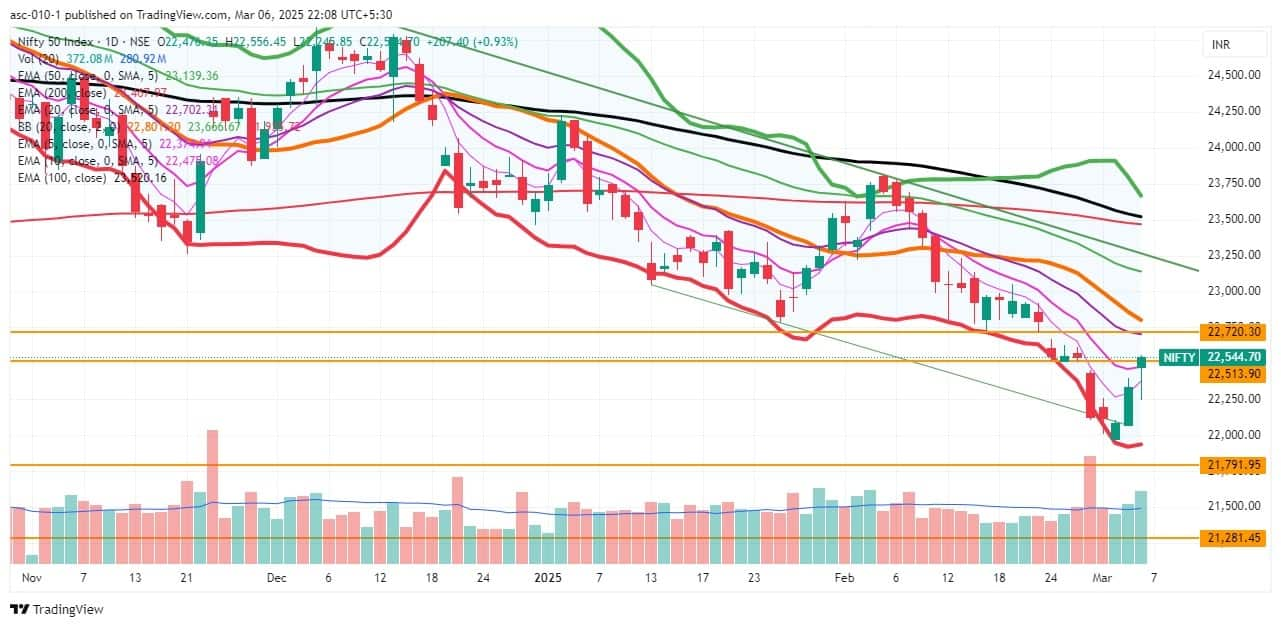
Here are 15 data points we have collated to help you spot profitable trades:
1) Key Levels For The Nifty 50 (22,545)
Resistance based on pivot points: 22,568, 22,641, and 22,760
Support based on pivot points: 22,330, 22,257, and 22,138
Special Formation: The Nifty 50 formed a bullish candle with a long lower shadow on the daily charts, indicating buying interest at lower levels. This candle resembles a Hanging Man-like pattern, a bearish reversal pattern, which is not a classical one. The index needs to climb above the midline of the Bollinger Bands (22,800) for stronger bull strength. The momentum indicator, the RSI (Relative Strength Index) of 41.42, is trending upward but remains in the lower band.
2) Key Levels For The Bank Nifty (48,628)
Resistance based on pivot points: 48,795, 48,922, and 49,128
Support based on pivot points: 48,383, 48,255, and 48,049
Resistance based on Fibonacci retracement: 49,402, 50,375
Support based on Fibonacci retracement: 47,881, 46,078
Special Formation: The Bank Nifty also formed a similar kind of pattern to the Nifty 50 and sustained its higher highs-higher lows formation for another session. The index trended higher for the third consecutive session, up by 138 points. The 49,100 level (the midline of the Bollinger Bands) is expected to be crucial for a strong upward journey in the banking index. The RSI has been trending upward since Tuesday and reached 43.87 but remained in the lower band.
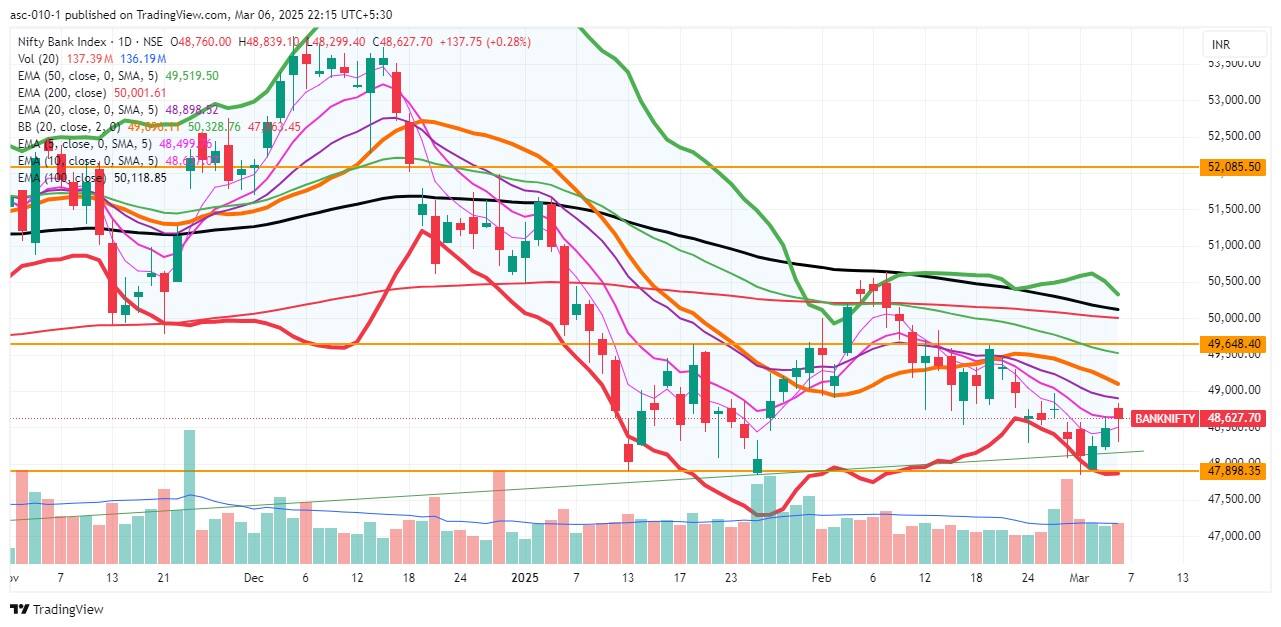
According to the weekly options data, the maximum Call open interest was seen at the 23,000 strike (with 48.67 lakh contracts). This level can act as a key resistance for the Nifty in the short term. It was followed by the 23,500 strike (42.03 lakh contracts) and the 22,500 strike (39.17 lakh contracts).
Maximum Call writing was observed at the 23,100 strike, which saw an addition of 25.86 lakh contracts, followed by the 22,800 and 23,000 strikes, which added 22.67 lakh and 21,68 lakh contracts, respectively. The maximum Call unwinding was seen at the 22,100 strike, which shed 2.11 lakh contracts, followed by the 22,250 and 22,200 strikes, which shed 1.27 lakh and 9.48 lakh contracts, respectively.

On the Put side, the 22,500 strike holds the maximum Put open interest (with 52.63 lakh contracts), which can act as a key support level for the Nifty. It was followed by the 22,000 strike (46.17 lakh contracts) and the 21,800 strike (45.43 lakh contracts).
The maximum Put writing was placed at the 22,500 strike, which saw an addition of 46.19 lakh contracts, followed by the 22,400 and 21,800 strikes, which added 30.2 lakh and 28.46 lakh contracts, respectively. There was hardly any Put unwinding seen in the 21,700-23,550 strike band.

5) Bank Nifty Call Options Data
According to the monthly options data, the 50,000 strike holds the maximum Call open interest, with 13.95 lakh contracts. This can act as a key resistance level for the index in the short term. It was followed by the 49,000 strike (13.21 lakh contracts) and the 48,500 strike (8.26 lakh contracts).
Maximum Call writing was visible at the 50,000 strike (with the addition of 1.33 lakh contracts), followed by the 49,000 strike (1.31 lakh contracts) and the 48,700 strike (62,580 contracts). The maximum Call unwinding was seen at the 50,600 strike, which shed 77,760 contracts, followed by the 48,300 and 48,400 strikes, which shed 20,400 and 4,620 contracts, respectively.

6) Bank Nifty Put Options Data
On the Put side, the maximum Put open interest was seen at the 48,000 strike (with 12.32 lakh contracts), which can act as a key support level for the index. This was followed by the 47,000 strike (11.52 lakh contracts) and the 48,500 strike (8.35 lakh contracts).
The maximum Put writing was observed at the 47,000 strike (which added 1.35 lakh contracts), followed by the 48,500 strike (1.07 lakh contracts) and the 47,200 strike (94,530 contracts). The maximum Put unwinding was seen at the 50,500 strike, which shed 28,260 contracts, followed by the 47,500 and 47,900 strikes which shed 14,460 and 11,880 contracts, respectively.

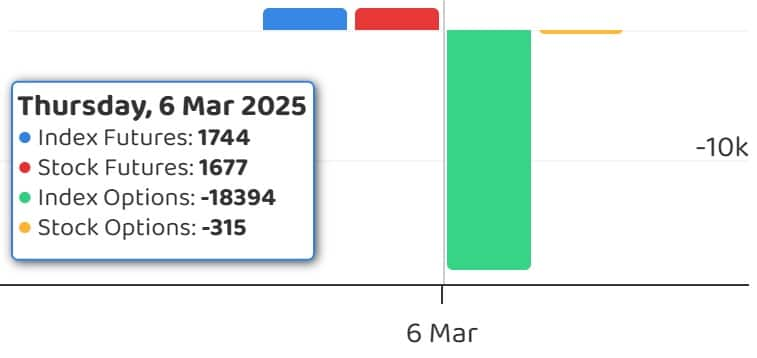
The Nifty Put-Call ratio (PCR), which indicates the mood of the market, climbed further to 1.14 (the highest level since February 4) on March 6, against 1.05 in the previous session.
The increasing PCR, or being higher than 0.7 or surpassing 1, means traders are selling more Put options than Call options, which generally indicates the firming up of a bullish sentiment in the market. If the ratio falls below 0.7 or moves towards 0.5, then it indicates selling in Calls is higher than selling in Puts, reflecting a bearish mood in the market.
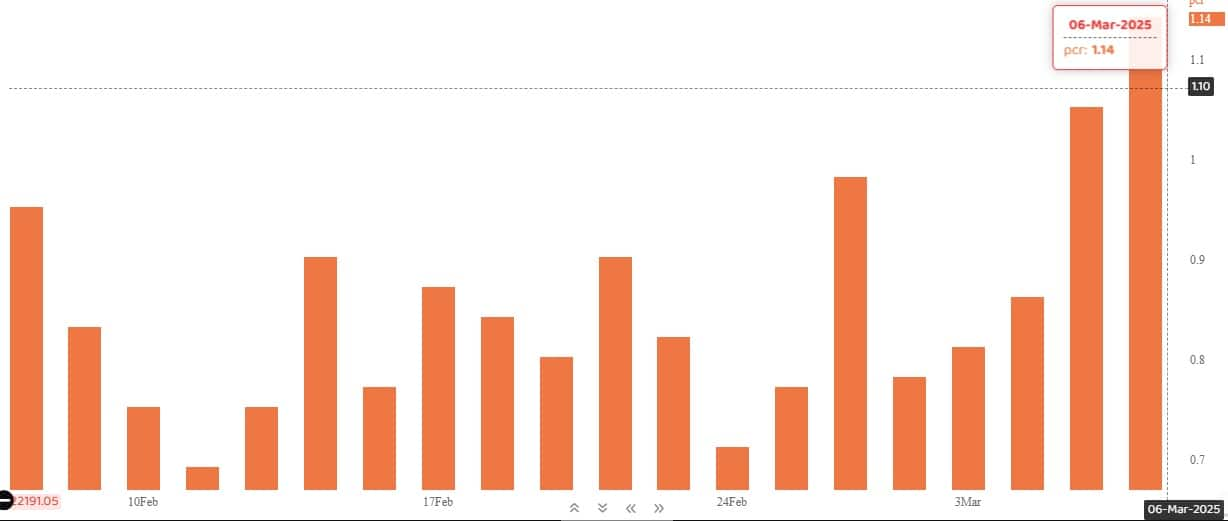
9) India VIX
The India VIX, the fear factor, continued to be supportive for the bulls as it remained below all key moving averages and sustained in the lower zone. The index rose by 0.4 percent to 13.73 levels.
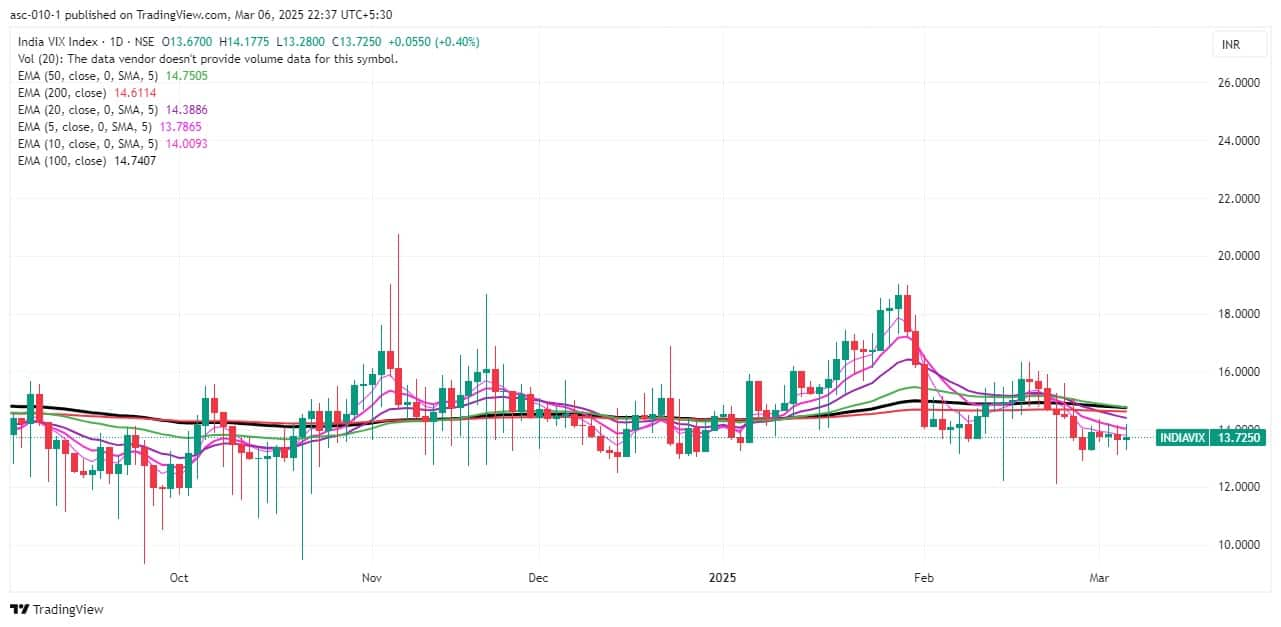
A long build-up was seen in 74 stocks. An increase in open interest (OI) and price indicates a build-up of long positions.
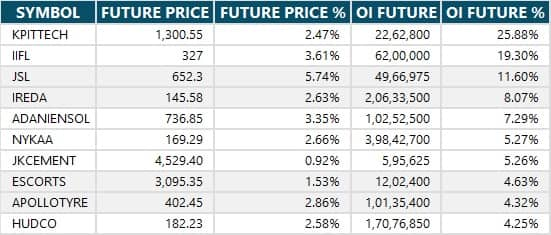
11) Long Unwinding (24 Stocks)
24 stocks saw a decline in open interest (OI) along with a fall in price, indicating long unwinding.
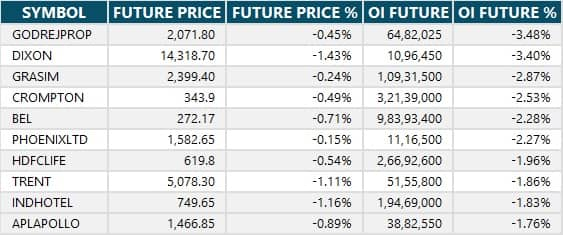
12) Short Build-up (31 Stocks)
31 stocks saw an increase in OI along with a fall in price, indicating a build-up of short positions.
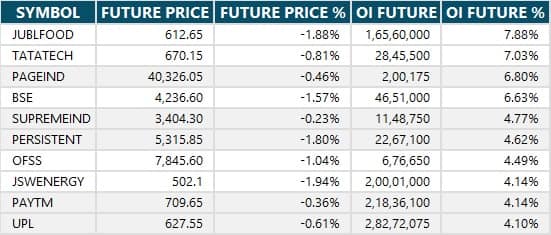
13) Short-Covering (91 Stocks)
91 stocks saw short-covering, meaning a decrease in OI, along with a price increase.

Here are the stocks that saw a high share of delivery trades. A high share of delivery reflects investing (as opposed to trading) interest in a stock.

Securities banned under the F&O segment include companies where derivative contracts cross 95 percent of the market-wide position limit.
Stocks added to F&O ban: Nil
Stocks retained in F&O ban: Manappuram Finance
Stocks removed from F&O ban: Nil
Disclaimer: The views and investment tips expressed by experts on Moneycontrol are their own and not those of the website or its management. Moneycontrol advises users to check with certified experts before taking any investment decisions.
Disclosure: Moneycontrol is a part of the Network18 group. Network18 is controlled by Independent Media Trust, of which Reliance Industries is the sole beneficiary.
Discover the latest Business News, Sensex, and Nifty updates. Obtain Personal Finance insights, tax queries, and expert opinions on Moneycontrol or download the Moneycontrol App to stay updated!
Find the best of Al News in one place, specially curated for you every weekend.
Stay on top of the latest tech trends and biggest startup news.